Quick List of Different Residential Elevator Types
Here are the 4 main types of residential elevators, divided by their operation mechanisms. Some of these types are further divided into sub-categories. We’ve gone over them briefly for convenience:
| Type of Elevator | Main Difference | Best Case Use |
| Hydraulic Elevators | Use fluid dynamics to move | Most use cases |
| Traction Elevators | Reliable and traditional elevators | Most buildings |
| Vacuum Elevators | Use air pressure to move | Homes |
| Pitless Elevators | Do not require a pit beneath | To save space in any building |
| MRL Elevators | Do not have machine rooms | To save spave in any building |
Types of Residential Elevators in Detail
Here are some of the main types of residential elevators and their features:
1. Hydraulic Elevators
| Types of Hydraulic Elevators | Conventional, Roped, Hole-Less |
| Max Speed Per Minute | 150 ft |
| Used For | Up to 8 Story Buildings |
Conventional Hydraulic Elevator: These elevators have a pit and sheaves, which go below the base of the pit. The pit also contains a piston that retracts and extends when the elevator moves.
Roped Hydraulic Elevators: These elevators use both ropes and pistons to control the elevator car. These lifts are much better and more consistent, with an improved motion, which makes them great for homes.
Hole-Less Hydraulic Elevators: Instead of the standard pistons, hole-less elevators do not contain the sheaves below the elevator. These elevators are much better for small residences because of their limited movement.
Hole-less elevators are great because of the telescoping pistons, which make everything much smoother. These are also much more affordable residential elevators compared to others, with lower maintenance costs.
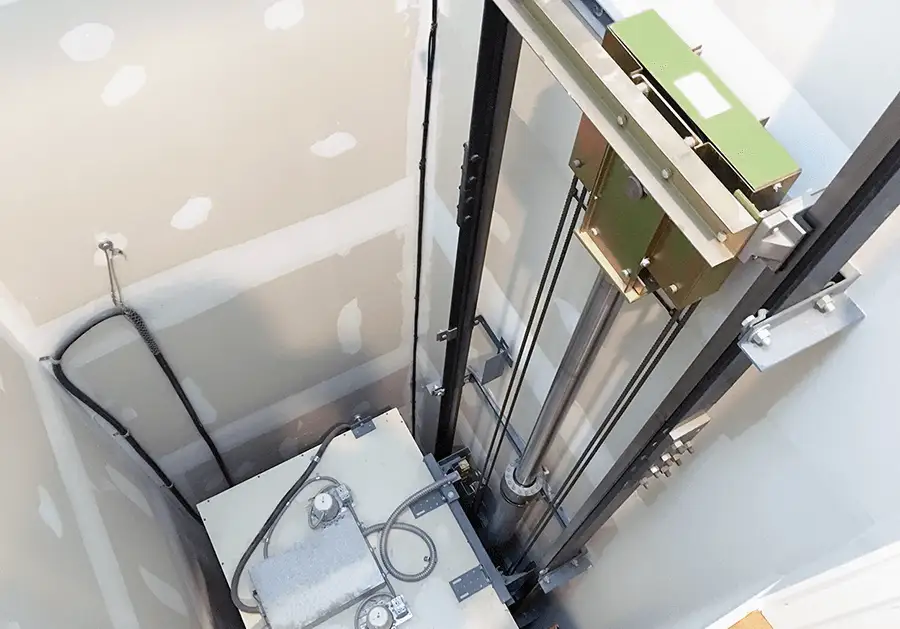
2. Traction Elevator
| Types of Traction Elevators | Geared, Gearless |
| Max Speed Per Minute | 500 ft |
| Used For | Low to High Rise Buildings |
Traction elevators use ropes, wheels, and an electric motor to operate. These elevators are much easier to operate and can work in high-rise or medium-sized buildings (These elevators are suitable for any building from low rise to high rise). Compared to hydraulic elevators, they are much faster and more consistent.
Here are the two main types of traction elevators:
Geared Traction Elevator: These elevators have a gearbox that is attached to the motor. The gears move the ropes that suspend the car and the counterweight. Geared elevators are quite common because of their moderate speeds and smooth functions.
Gearless Traction Elevator: These elevators are much faster and smoother than geared traction elevators. You can find these elevators in high-rises or buildings that are 20 stories or higher.
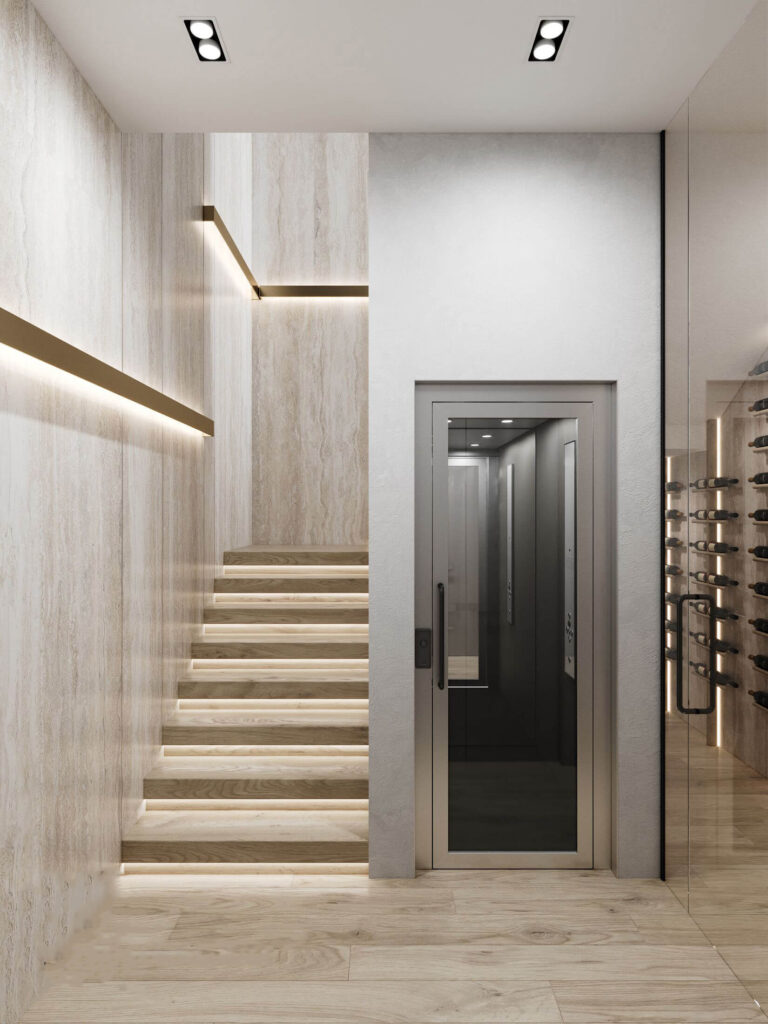
3. Shaftless Elevators
| Types of Shaftless Elevators | Multiple |
| Max Speed Per Minute | 20 ft |
| Used For | Homes |
These are the best elevators for homes and residences because they save space and keep your budget low. Shaftless elevators are very space-efficient because they do not require an elevator shaft. You can easily fit them into your existing home.
Perhaps the most popular type of shaft-less elevator is a “through-the-floor.” As the name implies, these types of elevators can be installed by cutting a part of your floor and retrofitting the mechanism.
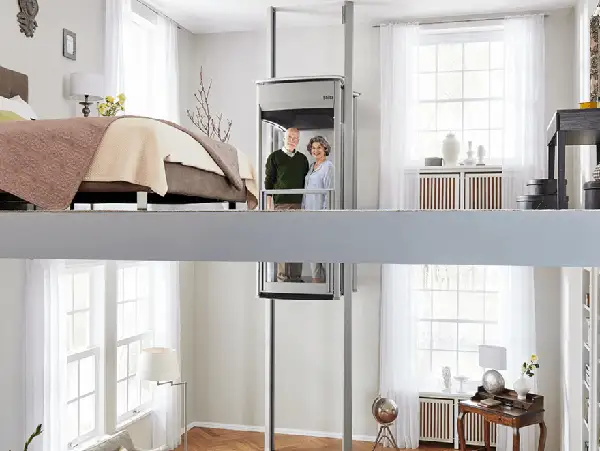
4. Vacuum Elevators
| Types of Vacuum Elevators | Conventional, Roped, Hole-Less |
| Max Speed Per Minute | 20 to 80 ft |
| Used For | 2 to 6 Story Buildings |
These are stylish, elegant, and very functional elevators that are perfect for residences. Instead of ropes, pulleys, and gears, these elevators use suction devices to operate. By manipulating the air pressure above or below, the elevator ascends and descends.
These elevators are very versatile because they are similar to shaftless elevators. On the downside, these elevators have a small load capacity. It’s perfect for residences when you use it carefully and maintain it properly.
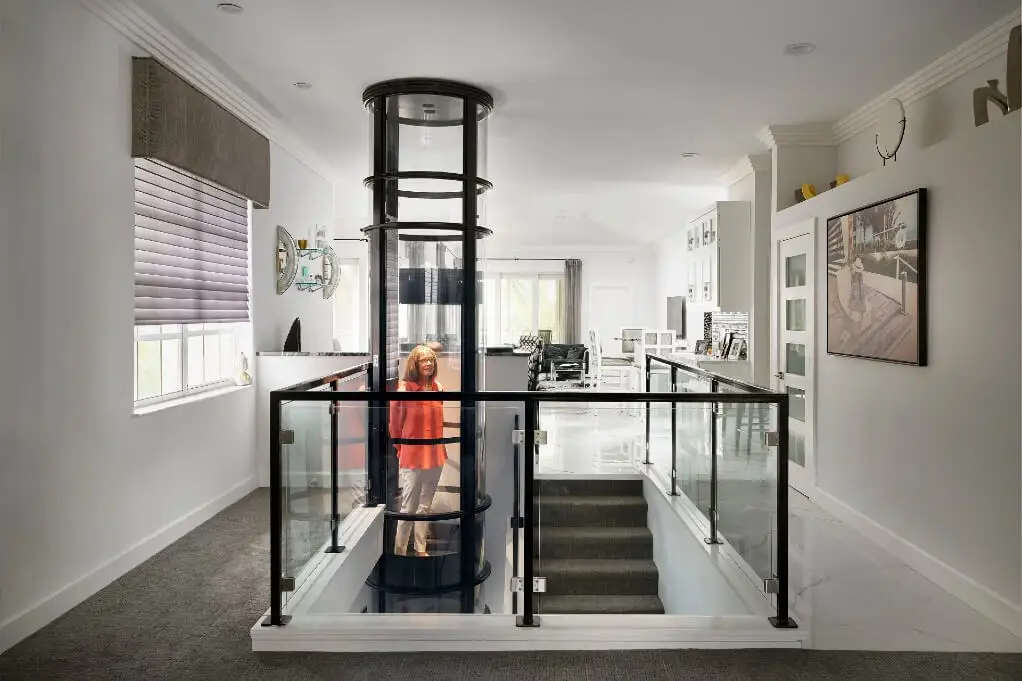
5. Pitless Elevator
| Types of Pitless Elevators | Conventional, Roped, Hole-Less |
| Max Speed Per Minute | 40 to 80 ft |
| Used For | 2 Story to Mid Rise Buildings |
As the name implies, these elevators do not have a pit. You don’t have to cut into the ground of your home to make the pit, which makes it more economical. These elevators sit on ground level and are perfect for small homes, with wooden foundations.
These elevators usually use ropes and a motor to ascend and descend. Winding drum elevators can be a type of pitless elevator. You’ll have to be more careful with maintenance because they don’t have the added safety of hydraulic elevators and pit support.
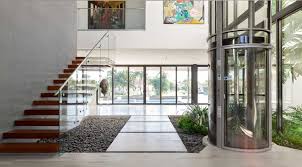
6. Machine Room Less Elevator
| Types of Machine Room Less Elevators | Conventional, Roped, Hole-Less |
| Max Speed Per Minute | Up to 500 ft |
| Used For | Personal Homes and Mid-Rise Buildings |
Normal elevators have a machine room at the top of the shaft. Machine Room Less elevators replace this with a small machine right above the elevator. This is accessed through a door at the top of the elevator.
Compared to other elevators, MRLs are much more compact. They are perfect to mid-rise buildings and even residential homes. Please remember, that some elevators by design do not require a machine room, while others do need one.
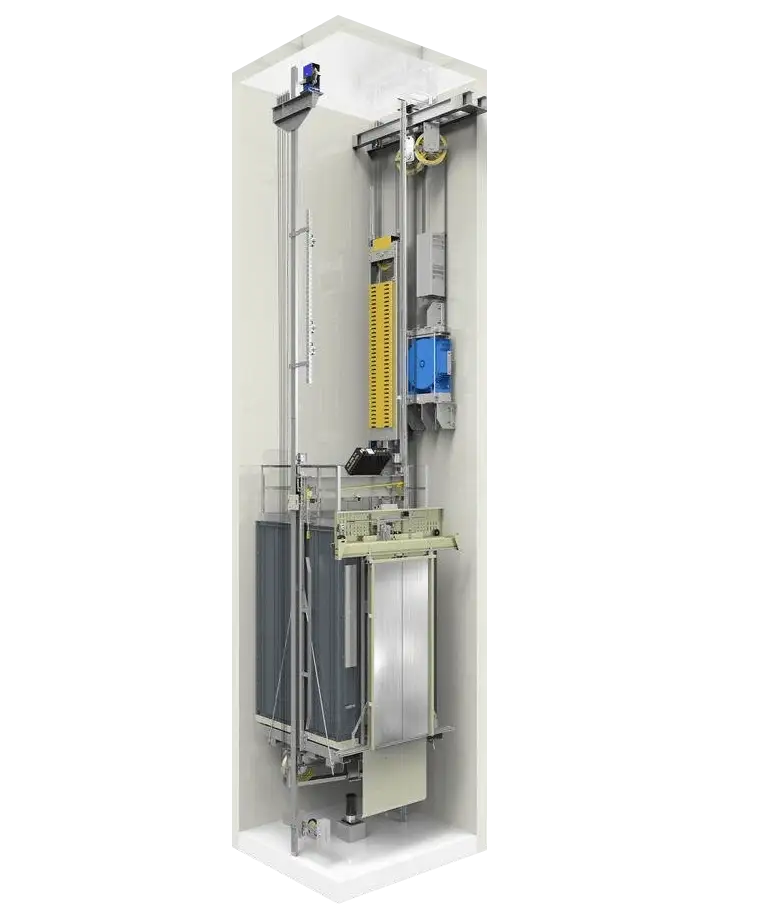
Other Differences Between Residential Elevators
There are other differences between residential elevators that we have to discuss. These differences include:
Design: Residential lifts and elevators can come in various shapes and designs for homes. You can go for elevators with transparent sides. Another aspect of the design is the shape of your elevator, for example, some can be square while others are circular.
Loading Capacity: Various residential elevators have different loading capacities. Loading capacity affects the maximum weight that an elevator can bear. The different types of elevators can have varying loading capacities.
Cost: The design and type of different residential elevators can also affect the elevator cost. The more intricate and efficient your elevator is the more it can cost. However, please remember that the most expensive isn’t necessarily the best option for a home.
How to Choose the Right Elevator for Your Home?
The best way to find an elevator for your home is to consider your needs. For example, how much space do you need in an elevator and how much space are you willing to allocate for the elevator. If you don’t have a lot of space in your house, you could go for a through-the-floor design elevator.
Another thing to consider is the budget. Elevators with varying loading capacities and prices will cost different amounts. You could spend anything from $15000 to $30000 for an average residential elevator. This includes the material, construction, and elevator installation costs.
At DAZEN, we make the best home elevators. Our traction residential elevators give you the security and reliability that you desire. We even help with the home elevator installation process.
The best part is that we at DAZEN do this at affordable prices. We give you the home elevator you need with the best materials and craftsmanship of our experts. Contact us today to get a quote and get your custom residential elevator system.
